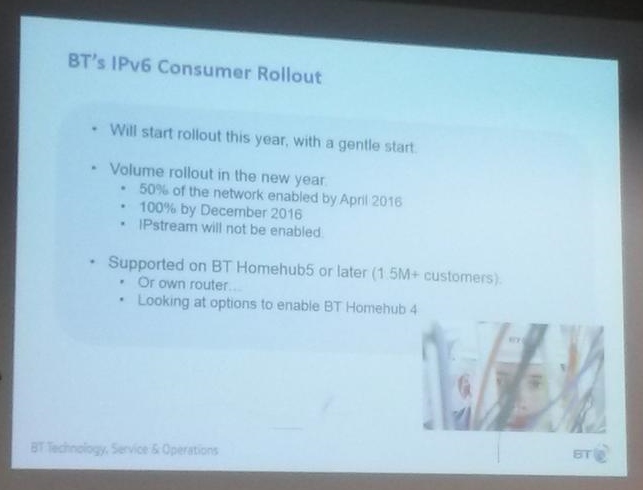UPDATE3 BT to Deploy IPv6 Across Entire Network by December 2016
The first hints that something significant was about to happen surfaced in July 2015 (here) and now BT’s Consumer division has just confirmed that they intend to deploy the Internet Protocol v6 (IPv6) Internet addressing standard across their entire network by December 2016.
The telecoms and Internet giant has long spoken of being “committed to the development and support of IPv6 on our networks and services“, adding that they have a related “programme of investment in our network and systems over the next few years“, yet until recently nobody was quite sure when BT would actually get around to implementing it across their entire network.
Advertisement
All that uncertainty has now changed after the operator informed the 2nd UK IPv6 Council Meeting in London today of their plans, which will see the “new” Internet addressing standard deployed to 50% of their national network in the United Kingdom by April 2016 and then 100% by December 2016. The deployment will officially get underway this year with a very “gentle start“.
Customers with one of BT’s latest HomeHub 5 broadband routers will be the first to get the service and the ISP is also looking at an upgrade for their existing HomeHub 4, but those with older hardware may be out of luck. The following is a slide from today’s announcement.

Presently all of the major broadband ISPs still assign a traditional IPv4 (Internet Protocol version 4) address to your connection each time you go online, which looks a bit like this: 84.123.12.5 (yours will have a different number). It’s effectively the Internet equivalent of a phone number, which helps your hardware and software to communicate with remote servers, although it’s not strictly speaking “personal” to you because an IP can reflect many different users or devices on a single broadband connection.
The problem is that IPv4 addresses are no longer being distributed (they ran out a little while back) and so the whole system will eventually need to be moved over to the new IPv6 standard (example address: 2001:cdba::2257:9652), which are longer / more complicated and thus aren’t likely to run out anytime soon.. if ever.
Advertisement
However IPv6 requires ISPs to adopt an expensive dual-stack network so that both IPv4 and IPv6 addresses can communicate (i.e. they’re not directly compatible). At present most of the big ISPs still have enough spare IPv4 addresses to keep them going for a few years, but those won’t last forever and ISPs are making sure they’re ready.
Sky Broadband have been running their own large-scale trials of IPv6 (here) and they plan to begin a similar deployment to BT’s in the very near future. Meanwhile smaller ISPs, such as Aquiss, AAISP, Fluidata and many others, have actually been running dual-stack IPv6 networks for several years. So it’s no surprise that BT should follow.
Until recently one of the problems for big ISPs was the lack of consumer hardware with IPv6 support, although this has changed dramatically over the past couple of years and now most new routers include IPv6 as standard (the same is true for a lot of related networking hardware and or software).
So what does this mean for consumers? Well initially, not a lot. If the ISP has done its job correctly then the transition should be seamless, you simply won’t notice a difference except for now having both an IPv4 and IPv6 address attached to your connection. Eventually IPv4 will need to be completely switched off, but that could take many years and in the meantime ISPs will need to continue running both side-by-side.
Advertisement
NOTE: In the above slide BT excludes “IPstream“, which is an older broadband technology (e.g. 20CN ADSL) that has already been withdrawn from the vast majority of their network.
UPDATE 24th September 2015
Sky has just confirmed to us that they currently have over 1 million staff and customers live on their IPv6 trial and will continue to test it over the course of this year, although they are NOT yet enabling it by default and will only begin the official roll-out after their testing is completed.
UPDATE 24th September 2015 @ 1:36pm
We have a new comment from the RIPE Network Coordination Centre, which is one of the worlds five Regional Internet Registries (RIRs).
Nathalie Künneke-Trenaman, RIPE NCC’s IPv6 Program Manager, told ISPreview.co.uk:
“It’s great to see BT announce a target date for full IPv6 deployment. In the RIPE NCC’s service region – which includes Europe – IPv4 reached its exhaustion point in September 2012, and everywhere else around the world, except Africa, has also reached exhaustion.
This means any organisations relying solely on IPv4 will start to struggle to grow in size and complexity in the future. IPv6 is essential to safeguard the growth of the Internet, especially in the UK which is technologically advanced with Internet-connected devices ranging from smartwatches through to automated homes.”
UPDATE 24th September 2015 @ 4:01pm
The BBC seem to have picked up on our story and so finally BT have been nudged into giving us a statement, even if it did take 24 hours to construct.
A BT Spokesperson told ISPreview.co.uk:
“We are currently completing trials of IPv6 with a small group of BT employees, before moving on to trials with customers. BT has a strategy to include IPv6 for its customers in good time and ensure that the transition from IPv4 to IPv6 is seamless. At the moment, customers can experience everything the internet can offer with IPv4.
Depending on the results of trials with customers, we would aim to enable the network for IPv6 during the 2016/17 financial year. We expect customers with a Home Hub 5 will be able to take advantage of this soon afterwards, and are looking at options to enable customers with a Home Hub 4 to also benefit. We will provide more details closer to the time.”
Mark is a professional technology writer, IT consultant and computer engineer from Dorset (England), he also founded ISPreview in 1999 and enjoys analysing the latest telecoms and broadband developments. Find me on X (Twitter), Mastodon, Facebook, BlueSky, Threads.net and Linkedin.
« Q2 2015 UK Average Broadband Speeds Top 11.8Mbps vs 5.1Mbps Globally

















































Comments are closed